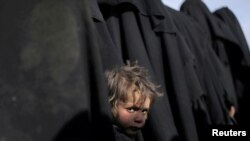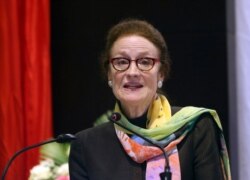The U.N. secretary-general said Wednesday that the situation in war-torn Syria “remains a living nightmare” a decade after the government sought to violently suppress peaceful protests and plunged the country into civil war.
“Hundreds of thousands of Syrians have died. Millions have been displaced. Countless others remain illegally detained and often tortured, missing, disappeared, or living in uncertainty and deprivation,” Antonio Guterres said. “For 10 years, the world has watched Syria spiral into destruction and bloodshed.”
He recited a litany of atrocities committed against the Syrian people: the bombing of homes, schools and hospitals; the siege and starvation of civilians who opposed the rule of President Bashar al-Assad; chemical weapon attacks against civilians; terrorist groups who seized territory in the chaos and abused people under their control.
“It is impossible to fully fathom the extent of the devastation in Syria, but its people have endured some of the greatest crimes the world has witnessed this century,” Guterres said.
He called for perpetrators to face accountability.
Consequences of conflict
Five-and-a-half million Syrians have fled to neighboring nations or have made the dangerous trek to Europe for safety. Of those who have remained in the country, 6.7 million are displaced and more than half the population is food insecure.
Guterres spoke from the podium outside the U.N. Security Council chamber. The 15-nation council has been largely paralyzed for the past decade over the situation.
Russia, Assad’s main ally, has deployed its veto more than a dozen times to block sanctions and other actions that might have helped end the bloodshed. It has also used that same power to curb humanitarian aid that could assist civilians living in opposition-held areas of the country’s north.
Moscow has also been supporting the Syrian military since late 2015, at the time rescuing Assad when he was on the brink of losing power. Assad remains in power today.
“It is clear that if war lasts 10 years, the international security governance system that we have is not effective,” Guterres responded when asked by a reporter whether the international community had failed the Syrian people. “This is something that should be a source of reflection about everybody involved.”
He said the parties have the opportunity to show their willingness to find common ground and recognize the need for all Syrians to move beyond a continual state of conflict.
“Failure to do so will only condemn the Syrian people to more despair,” he said. “We simply cannot let that happen.”
Smallest victims
The U.N. children’s agency, UNICEF, said 90% of Syrian children are in need of humanitarian assistance — a 20% increase from the past year.
“This cannot be just another grim milestone passing by in the world’s peripheral vision as children and families in Syria continue to struggle,” UNICEF Executive Director Henrietta Fore said in a statement Wednesday. “Humanitarian needs cannot wait. The international community should make every effort to bring about peace to Syria and galvanize support for its children.”
UNICEF said the situation in northern Syria was “particularly alarming,” with more than 75% of severe violations in 2020 being recorded in the northwest. Millions of children in the north have been displaced after their families were forced to flee multiple times searching for safety from the violence.
The agency said that across northeast Syria, 27,500 children and thousands of Syrian children with ties to armed groups were languishing in camps and detention centers. It noted that surging violence in the al-Hol camp highlighted the need for long-term solutions.
“There are no winners in this war, and the biggest loss is brought upon Syria’s children. It is time for warring parties to put the guns down and come to the negotiation table. Peace and diplomacy are the only way out of this abyss,” UNICEF said.






